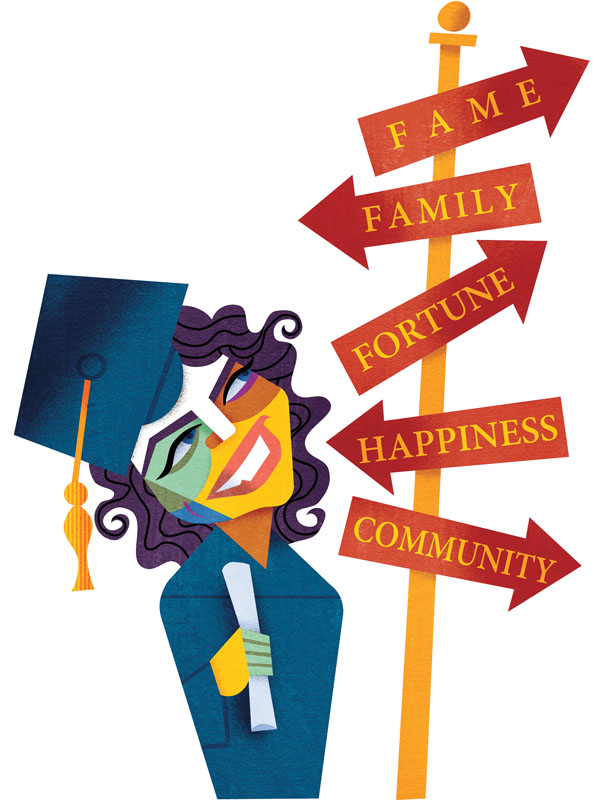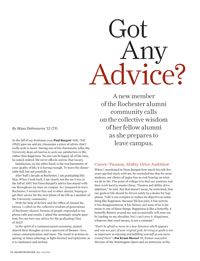Features
 (Illustration: David Cowles for Rochester Review)
(Illustration: David Cowles for Rochester Review)In the fall of my freshman year, Paul Burgett ’68E, ’76E (PhD) gave me and my classmates a piece of advice that I really took to heart. During one of his charismatic talks, the University dean advised us to seek out satisfaction in life, rather than happiness. No one can be happy all of the time, he noted; indeed, life never affords anyone that luxury.
Satisfaction, on the other hand, is the real barometer of your quality of life; it is having enough. To leave the dinner table full, but not painfully so.
After half a decade at Rochester, I am graduating this May. When I look back, I am clearly not the me I was in the fall of 2007, but Dean Burgett’s advice has stayed with me throughout my time on campus. As I prepared to leave Rochester, I turned to him and to other alumni, hoping to get their advice for the next phase of my life as a member of the University community.
About the Author
 ADVISEE: Maya Dukmasova (Photo: Brandon Vick)
ADVISEE: Maya Dukmasova (Photo: Brandon Vick)When not busy gathering advice for soon-to-be graduates, Maya Dukmasova ’12 (T5) has been completing her Take Five year, researching how the American media cover current events in the Middle East.
A philosophy and religion major, she has been president of the Undergraduate Philosophy Council and is a member of Phi Beta Kappa. She’s also an aspiring journalist who has freelanced for Rochester Magazine, the Phoenix New Times, and the Daily News Egypt.
A native of St. Petersburg, Russia, Dukmasova grew up moving around the United States, finally settling near Syracuse, N.Y.
Her own advice for students and graduates is to “take any opportunity, or make an opportunity, to travel.
“Nothing makes you grow more and understand yourself and the world better than being far away from home.”
—Kathleen McGarvey
With the help of Review and the Office of Alumni Relations, I called on the collective wisdom of generations of Rochester alumni. Dozens of people responded to my phone calls and emails. I asked the seemingly simple question: Do you have any advice for the graduating Class of 2012?
In the spirit of a commencement ceremony, alumni shared their thoughts across a spectrum of themes—love, career, communication, and more. The result is at times inspiring, at times sobering; as light-hearted and optimistic as it is cautionary and serious.
Career: ‘Passion, Ability Drive Ambition’
When I mentioned to Dean Burgett how much his talk five years ago had stuck with me, he reminded me that for most students, our choice of major has no real bearing on what we do in life. The point of college is to find our passions and then work hard to master them. “Passion and ability drive ambition,” he said. But that doesn’t mean, he reiterated, that our goals in life should be driven solely by a desire for happiness. “Life is too complex to reduce its objective to something like happiness. Because life has pain, it has sorrow, it has disappointment, it has failure, and none of us is immune to any of those things. Happiness is like a butterfly. A butterfly flutters around me and occasionally will treat me by landing on my shoulder, but I can’t own it. Happiness, whatever that word means, is not a constant.”
“Don’t be afraid to move in a new direction which appears and was not part of your original goal. Arriving at goals is not as important as enjoying and fulfilling yourself as you move toward them”—Pat Kraut Mossel ’55, former executive director of the Washington Opera and an instructor at the Osher Lifelong Learning Institute at the University of Delaware in Rehoboth Beach, Del.
“Stay positive, as it will serve you always”—Terri Feinglass Ross ’55, a real estate agent in Rochester.
“Keep your mind open to possibilities and you can accomplish anything you set your mind to do”—Patricia Dundon Larrabee ’77 (MS), founder and CEO of Rochester Clinical Research Inc. in Penfield, N.Y.
“Carve out at least a half an hour of time every day to read something that is thought provoking. And it does not have to be something related to your own field”—Les Loysen ’60, a nonprofit organization consultant in Middletown, N.J.
Ethics: ‘Your Personal Integrity Is Really the Only Thing You Have’
Regardless of the field in which we choose to focus our lives, alumni put a high priority on a strong commitment to ethical standards.
Speaking directly to Hajim School of Engineering graduates, Joe Carson ’76, an engineer for the Department of Energy in Knoxville, Tenn., said: “There are significant and persistent deficiencies to the scope and implementation of engineering ethics and, as a result, our profession enables much institutional evil around the world. My challenge to you—on your commencement as members of the engineering profession—is what can or should Meliora mean, given the significant and persistent deficiencies in the scope and implementation of engineering ethics.”
“Make sure you leave the University with a deep understanding of ethics, morality, and an appreciation of the extent to which history, ethnicity, culture, and economics give rise to the meaning of globalization in different countries”—J. Nelson Hoffman ’55, CEO of Rice Manufacturing in Snowmass Village, Colo.
“Your personal integrity is really the only thing you have, and it will last, and people will remember that. You’ll be judged on the quality of your work and not whether you outshine the person in the next office”—Robert Scala ’58M (PhD), a retired senior scientific advisor at Exxon Corp., now living in Tucson, Ariz.
“There are so many needs in the community and so many ways that a graduate of our University can help. We should all plan to participate in giving back throughout our lives to make the world a better place for everyone”—Carol Bieck Henretta ’62N (MS), ’94W (EdD), assistant professor emerita of clinical nursing at the School of Nursing.
Relationships: ‘Don’t Neglect Them’
Theresa Guenther ’90, an associate court attorney in Erie County Family Court, says it’s easy to dismiss the importance of other people’s perspectives. “I would urge students going out into the world to realize that everyone they come into contact with has something to offer; remember that, and respect others.”
“After 30 years of consulting with people and organizations, I have come to believe that success in anything you do—anything you do—is based on creating, developing and maintaining effective and meaningful relationships”—Jerry Gardner ’58, ’65 (MA), an executive coach in Atlanta, who specializes in following up on the “360- Degree Feedback” process.
“Do not neglect the importance of positive relationships with friends and family. This seems so trivial, but over the next few years, the memories you have with your classmates will be the ones that sustain you in the trenches of the real world. Preserve them, cherish them, and continue to nurture them”—Rene Herbert ’05, a program and budget analyst for the U.S. Department of Health and Human Services in Silver Spring, Md.
“I realize it sounds very elementary, but proper communication is one of the most important components in a successful, productive career. And a good marriage between husband and wife. If I could go back to enhance my education and better myself, I would have taken a course in communication. I would have improved my diction, my enunciation of words, and the pace and cadence of how I spoke”—Howard Silbersher ’60, a retired family dentist from Princeton, N.J.
“You will meet individuals in the workplace who are not always supportive. This can be because of lots of subjective and irrational feelings—resentment, envy, etc. Just try to ignore them”—Chita Angeli Duval ’57, ’78W (EdD), an educational consultant from Eastham, Mass.
Networking: ‘Every Person You Meet Is a Connection’
As a recent graduate, Alvin Lomibao ’09, an academic associate at North Shore-LIJ Health System in Manhasset, N.Y., knows all about making the transition from college life. “Be aggressive in networking—every person you meet is a connection that might help you further down the road,” he wrote.
“Two words: Burt Nadler. He has been instrumental in helping me meet my career goals. As alumni, we are so fortunate to have access to experts like Burt and other individuals at the UR Career Center”—Mary Delbalso Salter ’04, ’07M (MPH), a social worker at Strong Memorial Hospital, referring to the director of the Gwen M. Greene Career and Internship Center at the University.
“Network, network, network. Always take advantage of getting to know your classmates, colleagues, and peers”—Jonathan Mahoney ’03, a credit risk manager, and Amy O’Byrne ’04, an elementary school teacher, in Buffalo, N.Y.
“Networking with people from different backgrounds expands your knowledge base and prepares you for a diverse world”—Malik Evans ’02, president of an M&T Bank branch in Rochester and president of the Rochester City School Board.
Jobs, Jobs, Jobs: ‘Be Prepared to Create an Industry’
Gregory Meditz ’08, a law student at American University in Washington, D.C., is convinced that the economic and personal challenges our generation faces will forge us into stronger, better people. “Surround yourself with people who make you happy, and never stop setting goals for yourself, including moving into your own place!”
“You are going to have to do real tough work to get ahead; no more easy opportunities to the top of any industry”—Thomas Kraus ’05, ’07 (MS), an optical scientist in Springfield, Va.
“Don’t hesitate to change even midstream if it’s something you don’t like. Nowadays we live so much longer than we used to; we’ve got time”—Mark Zaid ’89, an attorney in Washington, D.C.
“The idea of coming out of college and finding a job somewhere, I think that’s a dying concept. I think the mentality should be to be prepared to create an industry, to create some sort of marketable skill that you can use to employ yourself”—Henri Muhammad ’98, who after graduating from the College’s Department of Music, opened his own music school in Buffalo.
“You will probably spend half of your weekday working hours—8 out of every 16 hours—at a job for decades. So, unless you truly wish to waste your entire working life and be miserable, figure out what you love, and then do it! That means not chasing money, not listening to your parents’ career lectures, not trying to figure out where the job growth market will be, or any other such extraneous factors”—Bill Dingfelder ’74, a freelance grant writer in Bala Cynwyd, Pa.
“Try especially hard to avoid allowing the future to loom large over you. Take the time to find a passion by exploring the world, its people and its many jobs”—March Bishop ’08, a Harvard Business School student.
“Remember that few young people are adequately paid for the job they do on the way up. You have to earn the salary of the next position in order to eventually receive it”—Ed Russell ’55, a volunteer analyst for the Alzheimer’s Association in Charlottesville, Va.
“Find the best job that matches your strengths (resources) to the job opportunity in an organization. This relationship can change as you gain experience. You must have passion for that fit. And that fit should meet your moral and ethical values”—John Mather ’64, executive director of master’s programs at the Tepper School of Business at Carnegie Mellon University in Pittsburgh.
“Take pride in your work, dot your i’s and cross your t’s. If you do a great job each day, in the end you will be financially rewarded. In life, success takes place when one recognizes the problem to be solved and then offers a solution”—Barry Swidler ’77, an owner of several small businesses in Brookville, N.Y.
“While a nice boss might make you happy, a tough boss with high expectations might actually drive you to become the best version of yourself”—Alexander Pearlman ’07, director of human capital at ReNEW Schools in New Orleans.
Don’t Forget the U of R: ‘Stay Connected’
Marlene Caroselli ’80W (EdD), a Pittsford, N.Y., author, keynoter, and corporate trainer who has published more than 60 books, told me of the value of her Rochester education. “My degree opened many doors as I worked to establish my business. But it also helped me determine when to knock on which doors, when to put my foot into certain other doors, and when to avoid some doors that would not advance my career. The University enriches beyond the education and degree programs it provides.”
“UR taught you how to be humble and how to work hard. Those two traits that you now own will get you further than any one thing you learned your entire life”—Chris Johnston ’04, ’06S (MBA), a sales and marketing expert from Newburyport, Mass.
“Stay connected to your alma mater and with the friends you made during your time at UR. Those relationships helped shape you into a young adult setting out in the world and they can continue to nurture you all through life”—Lorri Kahn Diggory ’88, who works in public relations from her home in Webster, N.Y.
Listening to Advice: ‘Have the Confidence to Question Yourself’
Bill Robinson ’72, director of legal affairs and counsel for a Cambridge, Mass., health care company, has a veritable decision-making game plan: “Be confident in, and realistic about, your strengths and qualities and have the confidence to question yourself. Then act on your decisions, avoiding both impulse and foot dragging. “Afterward, live honestly with your choice long enough to evaluate how you are doing and with realistic confidence. Again, question and decide.”
But with all the advice being given to the graduating students, sometimes it’s hard to know what to take to heart. When all is said and done, sometimes you just have to blaze your own trail. As Bill Dingfelder says, “Ignore all advice.”
And maybe that’s the real lesson: It seems that the most important thing good advice does is that it inspires confidence. Good advice reinforces your power and capacity to make decisions that are good for you, and not live someone else’s vision for your life.
There is seldom a right answer or path. Think critically and take the time to realize who you are. Look to the advice of the people you trust. Seek out satisfaction and never stop trying to make the world and yourself better.
Perhaps it all comes down to one thing: Meliora.r

